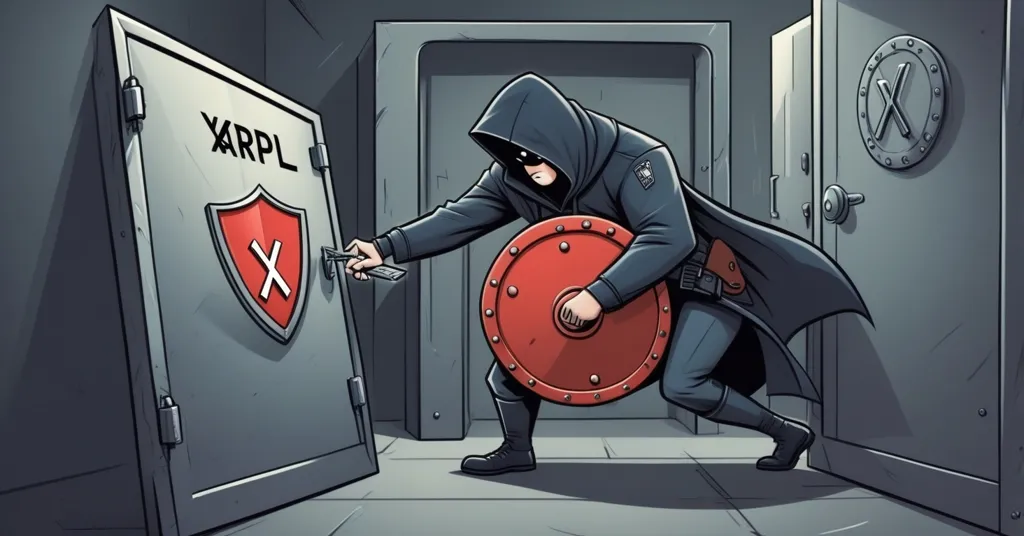Peter Todd Slams Ripple’s XRPL SDK Backdoor, Urges Crypto Security Overhaul

Peter Todd Exposes Critical Flaw in Ripple’s XRPL SDK, Urges Better Security Practices
In a blistering critique, Bitcoin developer Peter Todd, recently featured in an HBO documentary as a potential Satoshi Nakamoto, has spotlighted a significant security vulnerability in Ripple’s XRP Ledger (XRPL) SDK. The flaw, a backdoor in the code, was initially discovered by Aikido Security and confirmed by Ripple’s CTO David Schwartz, reigniting debates about blockchain security and the importance of code verification.
- Peter Todd criticizes Ripple over XRPL SDK backdoor.
- Aikido Security uncovers flaw compromising private keys.
- David Schwartz acknowledges issue and Todd’s past warnings.
The vulnerability in question, found in a JavaScript library, allowed private keys to be sent to an unauthorized domain, potentially exposing users’ funds. This backdoor, as Aikido Security detailed in their blog post, is a stark reminder of the risks associated with software supply chain attacks, or attacks on software distribution processes.
Peter Todd, known for his vocal stance on security, has been warning about these risks for nearly a decade. He emphasized the necessity of using cryptographic Pretty Good Privacy (PGP) signatures to verify software authenticity. PGP signatures are a type of cryptographic signature that ensures the integrity and authenticity of software, preventing attackers from injecting malicious code. Despite his advocacy for these security measures, Todd’s own bitcoin library, python-bitcoinlib, does not feature these PGP signatures. He attributes this to limitations imposed by the Python Package Index (PyPi), which discontinued support for signed downloads. In his words,
“My hands are tied.”
David Schwartz, Ripple’s CTO, acknowledged the severity of the flaw and admitted the validity of Todd’s earlier concerns, stating,
“At that time.”
Ripple has since taken steps to address the issue, releasing patches and security updates to mitigate the vulnerability.
This incident serves as a critical reminder of the ongoing challenges in maintaining software supply chain security within the cryptocurrency industry. As the sector continues to push the boundaries of decentralization and financial innovation, incidents like these underscore the importance of robust security practices to maintain trust in decentralized systems.
The Nature of the Flaw
The backdoor in the XRPL SDK allowed private keys to be transmitted to a suspicious domain, compromising user security. Aikido Security, in their detailed analysis, explained how the vulnerability was discovered and the potential risks it posed to users’ funds. This type of flaw is a classic example of a software supply chain attack, where malicious code is inserted into the development and distribution process of software.
Peter Todd’s Critique
Peter Todd’s critique of Ripple’s security practices is not new. He has been vocal about the need for better code verification for years, advocating for the use of PGP signatures. His recent spotlight in an HBO documentary has brought renewed attention to his warnings. While his own library lacks these signatures due to PyPi’s policies, his critique of Ripple remains valid and highlights a broader issue within the industry.
Ripple’s Response
In response to the discovered vulnerability, Ripple has moved swiftly to address the issue. David Schwartz’s acknowledgment of the flaw and Todd’s past warnings demonstrates a willingness to confront security challenges head-on. Ripple has released patches and updates to fix the backdoor, emphasizing their commitment to user security and the integrity of the XRPL.
Broader Industry Implications
The XRPL SDK flaw is part of a larger trend of software supply chain attacks affecting not just cryptocurrencies but all software ecosystems. This incident underscores the need for the industry to adopt and enforce robust security standards and verification practices. As the crypto world continues to celebrate the potential of decentralized technologies, incidents like these remind us of the importance of vigilance and security to ensure the future of finance.
The cryptocurrency industry’s reliance on open-source development adds another layer of complexity to security. While open-source tools offer transparency and community involvement, they also present unique vulnerabilities that must be addressed. Balancing the benefits of open-source development with the need for security is a challenge that the industry must continue to navigate. Security practices in blockchain development are crucial for maintaining trust and integrity.
Key Takeaways and Questions
- What is the nature of the security flaw in the XRPL SDK?
The flaw is a backdoor in a JavaScript library that allowed private keys to be sent to an unauthorized domain, potentially exposing users’ funds.
- Who initially discovered the vulnerability in the XRPL SDK?
Aikido Security was the first to identify the vulnerability.
- How did Ripple’s CTO, David Schwartz, respond to the security flaw?
David Schwartz acknowledged the flaw and admitted that Peter Todd’s earlier security concerns were valid at the time. Ripple released patches and updates to address the issue.
- What was Peter Todd’s earlier warning about Ripple’s code?
Todd warned about the risks of not verifying code with cryptographic PGP signatures, which could lead to attackers injecting malicious code.
- Why does Peter Todd’s python-bitcoinlib lack PGP signatures?
Todd attributes the lack of PGP signatures to the Python Package Index (PyPi) discontinuing support for signed downloads.
- What broader issue does this incident highlight in the cryptocurrency industry?
The incident underscores the critical need for robust security standards and code verification practices across blockchain development platforms.
As the crypto community champions decentralization, privacy, and the disruption of the status quo, it’s crucial to remember that security is the bedrock of this financial revolution. Incidents like the XRPL SDK flaw serve as a wake-up call, reminding us that while we embrace effective accelerationism and push the boundaries of innovation, we must also fortify our digital infrastructures. After all, in the world of crypto, security isn’t just a feature—it’s a fundamental necessity.



